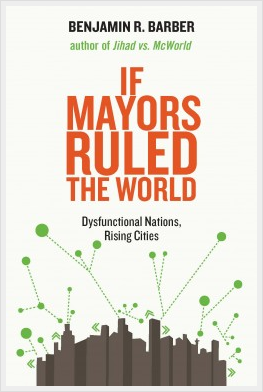
Cities need to share their data
30 October 2013
by Richard Forster
At The Economist Infrastructure Summit on Future Cities in London yesterday, Benjamin Barber, author of the book If Mayors Ruled the World: Dysfunctional Nations, Rising Cities, stated that one of the largest issues of disagreement when attempting to create liveable and sustainable cities, is the conflict between the public and private sectors.
“I think the largest issue of conflict involves the issue of market versus state, private versus public, the consumer versus the citizen,” said Barber, Senior Research Scholar at The Graduate Center of the City University of New York. “It is interesting that the market seems to address us as consumers, whereas democratic officials address us as citizens. If you ask someone what he or she wants, the response will depend on whether you are asking him or her as a consumer or a citizen. If you ask me what I want in terms of transportation as a consumer, I want a large powerful BMW, be able to drive it wherever I want and have public transportation move out of my way. If you ask me as a citizen I would say I want congestion zones and I actually don’t mind banning my BMW.”
Barber emphasised that the balance between public and private, between regulation and market incentives, between individuals and public good, are the balances that society will continue to battle with in trying to create liveable, sustainable cities.
Finding solutions to the challenges that local governments face will also depend on providing the technology community with real tangible data rather than megatrends. In the conference keynote address, Sascha Haselmayer, Co-founder and Chief Executive Officer of Citymart.com, stressed that city leaders need to be more willing to release data and publish the particular problems that they are facing.
“We have 557,000 local governments in the world and when we surveyed the decision makers in cities last year we found that 87 percent of cities have no process in place for unsolicited proposals that create new ideas, they just cant handle, deal or process the information,” said Haselmayer. “On top of this 90 percent of cities don’t publish their problems. If for example you are a company that produces technologies for blind people, how are you supposed to know which of the 557,000 potential clients require your services without some kind of release of data. We have to understand that cities need to learn like anyone else in the market, how to act as a consumer. We have found that if cities do start to communicate what their needs are, then the markets are actually ready to respond, react and invest.”
The importance of sharing knowledge and best practices between cities was raised throughout the day, with speakers promoting the exchange of information as a means of preventing too much reinvention. Stian Berger Røsland, Governing Mayor for The City of Oslo, underlined this when pointing out that, while healthy competition between cities can be beneficial, they also need to cooperate if they want to move forward.
“One of the key challenges facing humanity is climate change and it was an important moment for Oslo when, in December 2012, we became a member of the C40 Cities Climate Leadership Group,” said Røsland. “It is important to be partnering with other C40 members in attempting to make cities a leading force for climate action around the world. The role of the city is crucial in the transformation towards a low and zero emission society, and this can only be achieved by cooperating with and learning from other engaged cities.”











